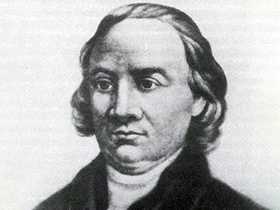You are here

1724 - 4/1/1777
A signer of the Declaration of Independence, John Morton broke the Pennsylvania delegation?s deadlock in favor of Independence.
John Morton was born in Chester (currently Delaware) County, Pennsylvania, in 1724. Morton's political career began in his thirties, when he was elected to the general assembly, and he was later a delegate for Pennsylvania to both the First and Second Continental Congresses. His contributions include: casting the deciding vote for independence for the state of Pennsylvania, reporting the Articles of Confederation, and signing the Declaration of Independence. Morton died in April 1776.
John Morton was born to Swedish emigrants in Ridley, Pennsylvania, in 1724. His father passed away shortly before his birth, and Morton had the good fortune to be raised by an Englishman who took great care to educate him in such practical matters as surveying. He married Anne Justis in 1745, with whom he had eight children. Although he received only three months of formal education, Morton's intellect and quick mind allowed him to secure a position in the provincial assembly in 1756. He held this post for several years until he was commissioned as a justice of the peace in 1764, where he was later sent as a delegate to the general assembly of Pennsylvania. In 1765, he became a member of the Stamp Act Congress, which proposed that taxation should be carried out by their own assembles and not through England. During his tenure, Morton was an active and distinguished member, and for some time, he was the speaker of the House of Representatives.
During this same period, Morton began his services as country sheriff and conducted his duties for three years with great satisfaction and dedication to public service. Morton was appointed judge of the court of general sessions and common pleas in 1770. In 1774, Morton was elevated to Associate Judge of the Supreme Court of Pennsylvania. Later that year, Morton was elected by the assembly to the Continental Congress, where he served from 1774 to 1776.
In regard to independence, Morton was originally against the idea. He wrote in a letter to a friend in England: "We are preparing for the worst that can happen, viz., a civil war. I sincerely wish reconciliation; the contest is horrid. Parents against children, and children against parent. The longer the wound is left in the present state, the worse it will be to heal at last" (Morton). However, Morton soured after England denied reconciliation efforts aimed at permitting the colonies greater autonomy while still under the crown. England's lack of compromise pushed Morton towards favoring independence. In the spring of 1776, with the delegates tied, Morton cast the deciding vote and would later sign the Declaration, committing Pennsylvania to independence. Morton's activism continued, as he was chairman of the committee to the adoption of the system of confederation, which later adopted the Articles of Confederation.
Morton was abandoned by many of his friends whose political beliefs differed from his. On his deathbed, Morton said, "Tell them they will live to see the hour when they shall acknowledge my signing the Declaration of Independence to have been the most glorious service that I ever rendered my country" (Morton). Shortly thereafter, Morton succumbed to inflammatory fever in April 1777 in Ridley Park, Pennsylvania. He was buried in St Paul's Burial Ground in Chester, Pennsylvania.
- Court rulings and personal correspondence composed by John Morton were unavailable for public access.
- Faragher, John Mack. The Encyclopedia of Colonial and Revolutionary America. New York: Facts of File, 1990.
- Goodrich, Charles A. Lives of the Signers to the Declaration of Independence. New York: William Reed & Co., 1856.
- Lanman, Charles. Biographical Annals of the Civil Government of the United States. 2 nd ed. New York: J.M. Morrison, 1887.
- Lanman, Charles. Dictionary of the United States Congress. Philadelphia: J.B. Lippincott & Co., 1859.
- "Morton, John." Biographical Directory of the United States Congress. 10 Nov. 2005. <>http://bioguide.congress.gov/scripts/biodisplay.pl?index=M001017>. Morton, John S. A History of the appellation Keystone State as Applied to the Commonwealth of Pennsylvania: together with Extracts from Many Authorities Relative to the Adoption of the Declaration of Independence by the Continental Congress, July 4 th, 1776; To Which is Appended the New Constitution of Pennsylvania with an Alphabetical Contents. Philadelphia: Claxton, Remsen & Haffelfinger, 1874.
- Vinci, John. "John Morton." Colonial Hall. 8 Jan. 2004. 10 Nov. 2005. <>http://www.colonialhall.com/morton/morton.php>
- Wilson, James Grant and Fiske, John. Appletons' Cyclopaedia of American Biography. New York: D. Appleton, 1899.
Photo Credit: "John Morton, signer of the Declaration of Independence.." 18th Century. Portrait. Licensed under Public Domain. Cropped to 4x3, filled background. Source: Online Resource.
